Eggs are great dietary sources of vitamin B12. A large egg contains 0.5 mcg of vitamin B12 or 20% of the recommended daily intake. They contribute to the daily intake. However, we can’t depend on them for vitamin B12, as we absorb less than 9%. Other common foods contain more vitamin B12 and have a better bioavailability of this crucial water-soluble vitamin that many people are deficient in.
Health benefits of vitamin B12
Vitamin B12 is crucial for life. It’s essential for DNA synthesis, red blood cell formation, cellular energy production, and the proper function of the central nervous system. Also, it plays a key role in the metabolism of homocysteine, which in high amounts can cause many diseases.[1,2]
How much vitamin B12 should we get in a day?
The recommended daily intake of vitamin B12 is 2.4 mcg, both for women and men. Pregnant and lactating women require slightly higher doses of 2.6 mcg and 2.8 mcg, respectively.
Vitamin B12 is found only in animal-based foods, such as fish, meat, poultry, dairy, and eggs. In contrast, plant-based foods contain no vitamin B12. Only fortified cereals, juices, and nutritional yeasts contain moderate amounts of vitamin B12.
Vitamin B12 deficiency is common. There aren’t many common foods high in vitamin B12.
How much vitamin B12 is in an egg?
The egg is a good dietary source of vitamin B12. A large egg contains approximately 0.5 mcg of vitamin B12, which is the equivalent of 20% of the recommended daily intake! A 3-egg omelet provides about 1.5 mcg of vitamin B12 or about 60% of the Daily Value!
Do the yolk or egg whites have more Vitamin B12?
Egg yolks contain vitamin B12, while egg whites do not. If you’re specifically looking to increase your vitamin B12 intake, consuming the yolks of eggs would be beneficial. This is true for most vitamins and minerals in eggs, as they are primarily stored in the yolk for embryo development.[3]
Eggshells do not contain vitamin B12 either. The eggshell is composed mainly of calcium carbonate. Just half an eggshell provides more calcium than we need a day! They were used for calcium supplementation for decades. Actually, eggs are good dietary sources of calcium!
Do free-range Eggs have more vitamin B12 than the conventional ones?
The vitamin B12 content in eggs can be influenced by various factors, such as diet, breed, and age of the hen. These factors can make it challenging to definitively attribute any observed differences solely to the housing method.
Hens primarily obtain vitamin B12 from their diet, which can include supplements like fish or meat meal, or whey powder, which are naturally rich in vitamin B12. Free-range hens might consume insects and worms that harbor vitamin B12 from their gut microbes. However, the contribution from this source is likely minimal.
Vitamin B12 is not typically obtained directly from microbes in the soil, as hens generally do not have the capability to obtain vitamin B12 from microbes in their gut that ferment plant material as ruminants (cows, sheep, goats) do.
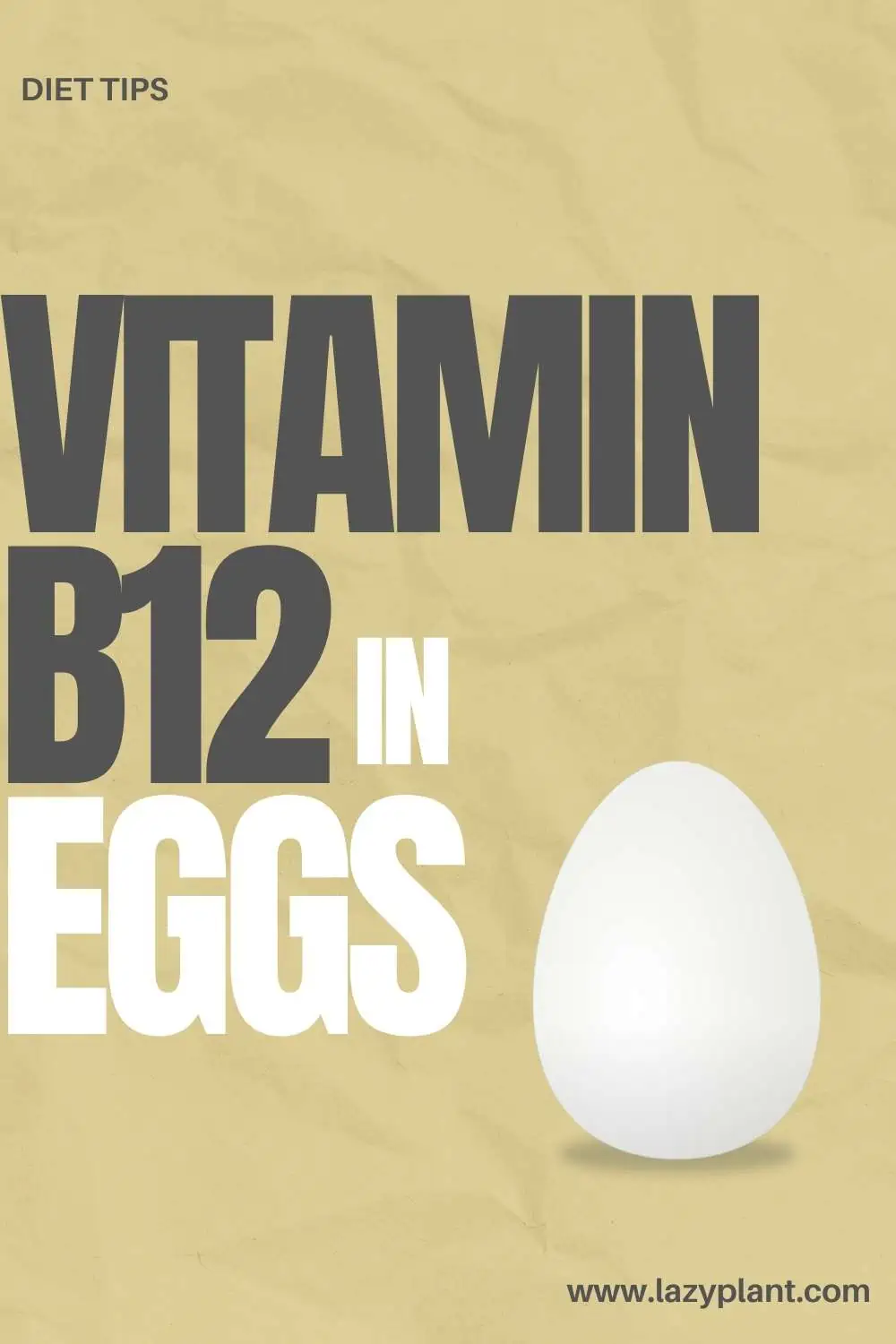
Are organic eggs worth the cost?
While some studies suggest potential small increases in organic eggs, the evidence is not robust enough to definitively claim a substantial difference.
Vitamin B12 levels in eggs can be influenced by various factors beyond the production method (diet, breed, age of the hen). These factors make it challenging to attribute any observed differences solely to being organic.
Regardless of minor variations in vitamin B12 content, both free-range and conventional eggs can be part of a healthy diet. They offer various essential nutrients, including protein, choline, and healthy fats.
You could choose organic eggs based on ethical concerns regarding animal welfare practices in conventional farming. Choosing organic eggs solely for the potential increase in vitamin B12 remains inconclusive.
Are there eggs fortified with vitamin B12?
Currently, there are no commercially available eggs specifically fortified with vitamin B12 in the market. While egg fortification with other nutrients like omega-3 fatty acids or vitamin D is sometimes practiced, vitamin B12 fortification is not commonly implemented.
Do darker eggs contain more Vitamin B12?
No, the color of the eggshell does not have any significant impact on the vitamin B12 content of the egg. The color of the shell is primarily determined by the breed of the hen and has no bearing on the nutritional value of the egg yolk or white.
Choosing eggs based on your personal preferences, such as taste, cooking methods, or ethical considerations, might be more relevant factors than focusing solely on shell color for nutrient content.
Vitamin B12 is primarily concentrated in the egg yolk, regardless of the shell color.
Do Vegan egg Replacers have vitamin B12?
While some vegan egg replacers may contain vitamin B12, it’s not guaranteed for all brands or products. Some manufacturers fortify their vegan egg replacers with vitamin B12, making them a potential source for vegans and vegetarians who might be at risk of deficiency.
Keep in mind that the amount of vitamin B12 added can vary significantly between different brands and products. It’s crucial to carefully read the ingredient list and nutrition facts panel of any vegan egg replacer to determine if it contains vitamin B12 and how much it provides. Look for vegan egg replacers that are specifically labeled as “vitamin B12 fortified”. Most brands aren’t fortified with vitamin B12, though.
You’ll find a wide variety of vegan egg replacers on Amazon.
Do we absorb the vitamin B12 in Eggs?
Vitamin B12 in eggs is poorly absorbed relative to other animal food products. We absorb less than 9% of the vitamin B12 in eggs. For comparison, the bioavailability of vitamin B12 in healthy humans from fish meat or chicken meat averages 42% and 61%-66%, respectively.[4]
Vitamin B12 in eggs is attached to certain proteins. This bond needs to be broken down during digestion for absorption. This process can be less efficient compared to the easily absorbable form of B12 found in meat, poultry, and fish.[3]
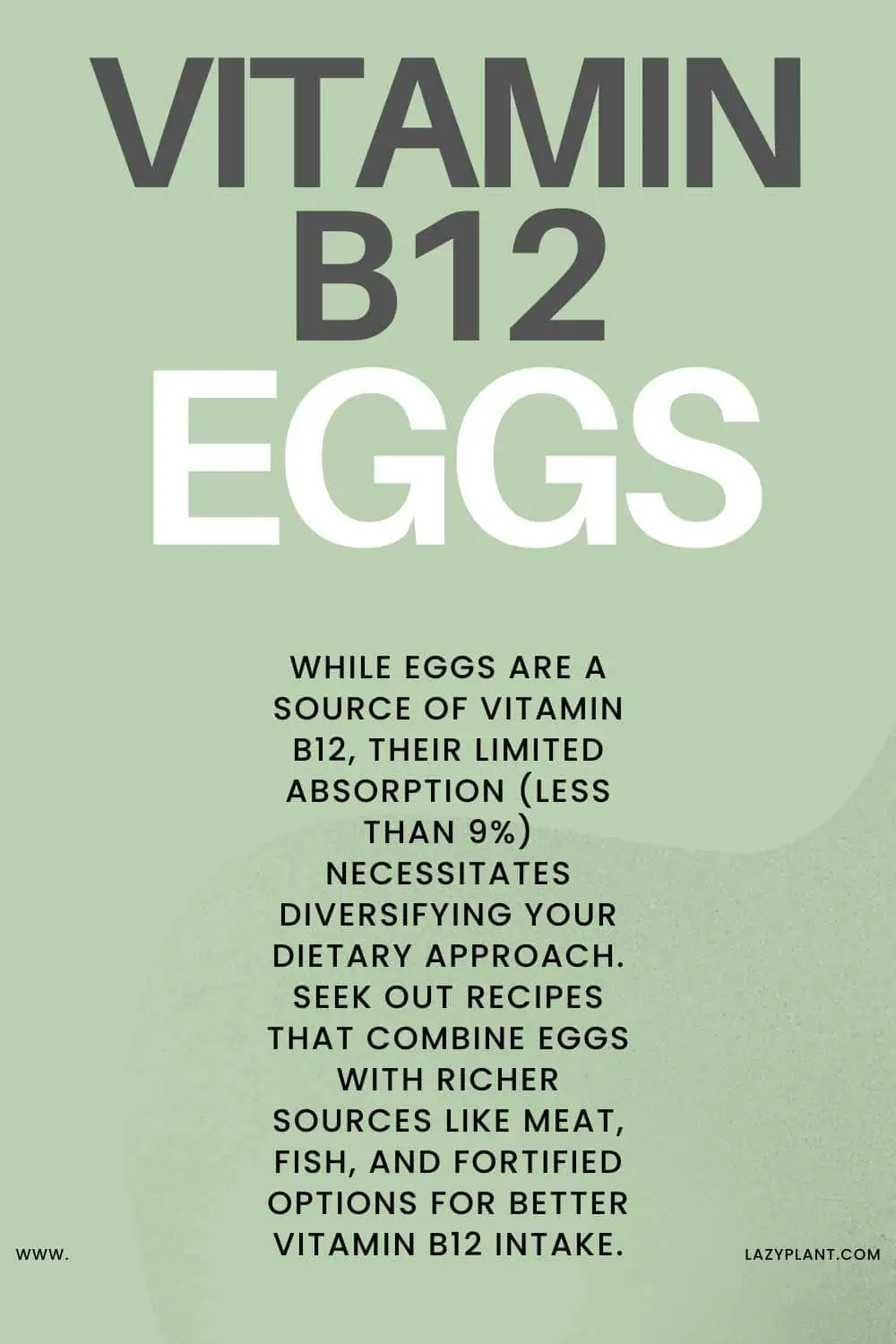
For example, avidin, a protein in egg whites, can bind to B12 and reduce its absorption. In fact, different vitamin B12 binding proteins seem to be present in egg whites and egg yolk.
The efficiency of B12 absorption can vary among individuals. Factors such as age, gastric acidity, and the presence of certain medical conditions can influence how well the body absorbs B12.
Compared to other animal sources like meat, poultry, and fish, vitamin B12 in eggs has a lower absorption rate due to the lack of intrinsic factor, a protein crucial for absorption.
How to eat Eggs for increased bioavailability?
Cooking can partially neutralize the effects of avidin and other binding proteins in egg yolk and egg white in a time-dependent manner.[5]
Cooking can break down these proteins, making the B12 more accessible for absorption during digestion.
However, cooking methods can influence the stability of B12. Vitamin B12 is sensitive to heat, light, and prolonged cooking times, so it’s best to use cooking methods that preserve nutrients.
Boiling or poaching eggs might be better than frying or scrambling at high temperatures for an extended period.
Vitamin C
Also, you could consume eggs with orange juice, as vitamin C can aid in vitamin B12 absorption. Hence, it’s a great idea to add to your egg recipes foods rich in vitamin C, such as broccoli, cauliflower, bell peppers, or tomatoes![6]
Dairy
Furthermore, you could combine dairy products with eggs in recipes to significantly increase vitamin B12 absorption. The bioavailability of vitamin B12 is about 3 times higher in dairy products than in meat, fish, and poultry![7]
Avoid eating Eggs with certain foods
Several factors can hinder vitamin B12 absorption, including certain foods and beverages. Better avoid consuming high amounts of these foods with eggs or other vitamin B12-packed foods.
Alcohol: Chronic alcohol consumption can negatively impact stomach acid production and impair vitamin B12 absorption from all sources, including food and supplements.
Coffee and tea: While not as significant as other inhibitors, large amounts of coffee and tea might have a mild temporary effect on vitamin B12 absorption. However, moderate consumption is generally not a major concern.
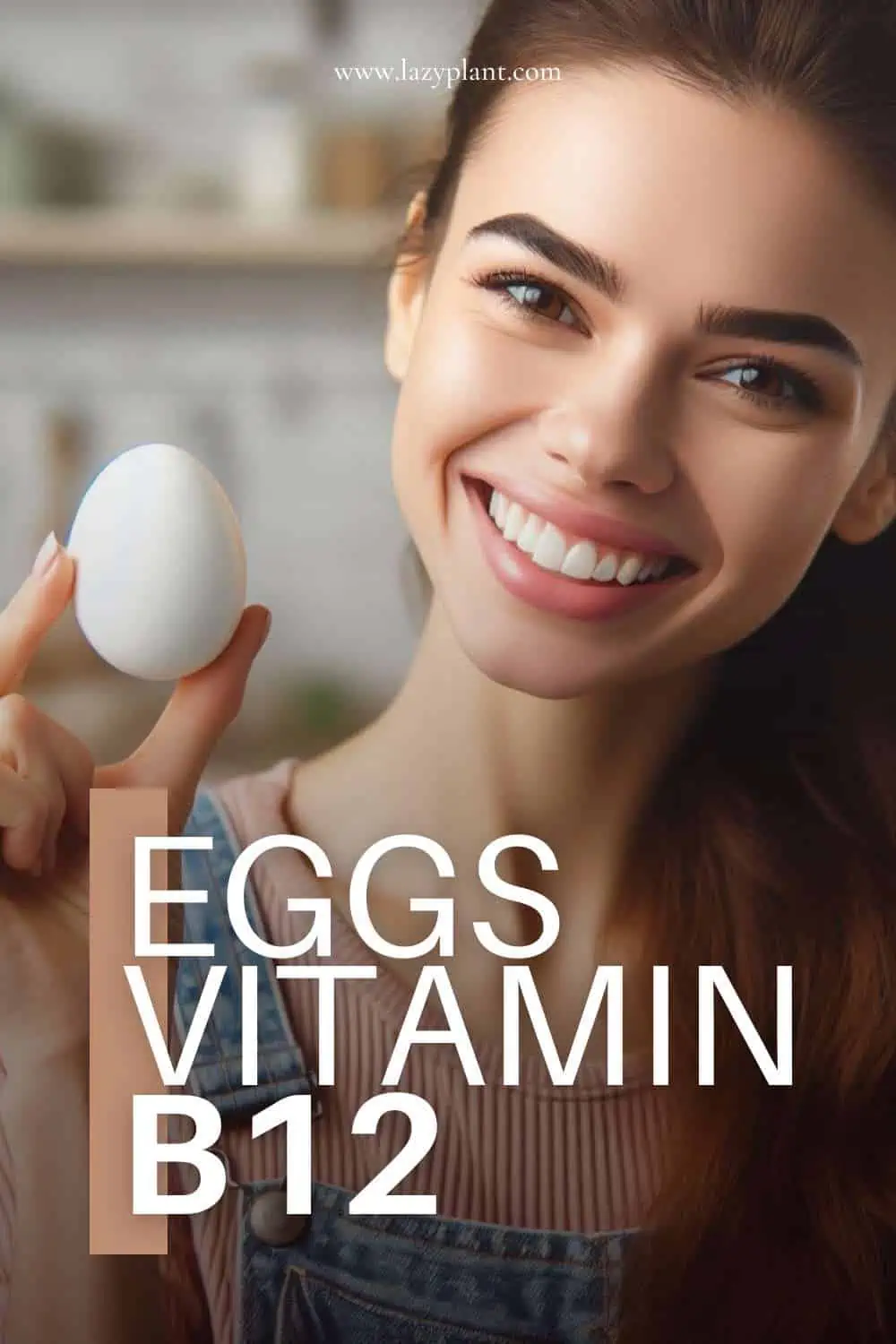
Certain medications: Some medications, such as proton pump inhibitors (PPIs) used for heartburn and acid reflux, can reduce stomach acid production, potentially impacting vitamin B12 absorption. It’s crucial to consult your doctor about potential interactions and alternative options if necessary.
Foods high in phytic acid: Phytic acid is a naturally occurring compound found in certain plant-based foods like nuts, seeds, legumes, and whole grains. While soaking, sprouting, or fermenting these foods can help reduce phytic acid content, it can still have a minor inhibitory effect on vitamin B12 absorption.
These factors typically have a temporary and mild effect on vitamin B12 absorption. A balanced diet with diverse sources of vitamin B12 can generally overcome these minor obstacles and ensure adequate intake for most individuals.
When should I eat Eggs for improved Vitamin B12 levels?
The timing of egg consumption doesn’t significantly impact absorption. To improve your vitamin B12 levels, it’s more important to focus on incorporating diverse sources of vitamin B12 throughout your day rather than concentrating on the specific timing of egg consumption.
Vitamin B12 absorption decreases drastically when high amounts are consumed (more than 1 mcg).
For increased absorption, better to avoid consuming eggs with vitamin B12 supplements. The bioavailability of vitamin B12 from dietary supplements is about 50% higher than that from food sources.
Does Cooking destroy Vitamin B12?
Cooking does not significantly destroy vitamin B12 in eggs or other animal products. Vitamin B12 is a relatively stable molecule and can withstand moderate heat exposure during cooking methods like boiling, frying, or baking.
Excessive heat and prolonged cooking times can potentially lead to some vitamin B12 degradation. Therefore, using moderate heat and avoiding overcooking can help preserve the vitamin content.
Cooking methods typically used for eggs are unlikely to significantly impact their vitamin B12 content.
Best ways to cook eggs
How to cook eggs is subjective and depends on various factors like personal preferences, desired texture, nutritional considerations, and cooking skills.
Best Options:
- Poaching: Preserves most nutrients, low in fat and calories, versatile for various dishes. Requires practice, might be more delicate to handle.
- Steaming: Retains nutrients, gentle cooking method, easy to control. May not achieve desired browning or crispy texture.
- Soft-boiling: Easy to prepare, retains runny yolk for dipping or spreading. Slightly higher cholesterol content compared to poached eggs.
Worst Options:
- Scrambled: Versatile, customizable with various ingredients, relatively quick and easy. Requires added fat for cooking, can become rubbery if overcooked.
- Omelets: Highly customizable with fillings, good source of protein. Requires more skill and attention compared to some methods, can be higher in calories depending on fillings.
- Frying: Easy and popular method, familiar taste and texture. Absorbs significant amounts of fat, potentially increases cholesterol intake.
- Hard-boiling: Convenient, portable, longer shelf life. Overcooking can make the yolk dry and crumbly, potential loss of some nutrients compared to gentler methods.
- Microwaving: Quick and convenient. Uneven cooking, potential rubbery texture, can destroy some nutrients.
The average absorption of vitamin B12 from boiled and fried eggs is more than twice that from scrambled whole eggs.[8]
Should I depend on Eggs for Vitamin B12?
Eggs are among the best dietary sources of vitamin B12. They help us meet our daily needs, but we shouldn’t depend 100% on them to get the recommended daily intake.
Vegetarians should eat Eggs regularly
For lacto-ovo vegetarians who consume both dairy and eggs, eggs can be a readily available and convenient source of vitamin B12 compared to some other vegetarian options.
Vegetarians should prioritize incorporating other dietary sources with higher vitamin B12 content, such as:
- Dairy products: Milk, cheese, and yogurt can be good sources, especially for lacto-vegetarians.
- Fortified foods: Many plant-based milks, cereals, and nutritional yeasts are fortified with vitamin B12.
- Vegan options: Some mushrooms and seaweed varieties might contain small amounts of vitamin B12, but their contribution is generally limited.
How many Eggs can I eat per day?
However, it’s important to note that egg yolks also contain cholesterol and fat, so it’s advisable to consume them in moderation, especially if you have dietary restrictions or health concerns related to cholesterol or fat intake. They’re among the richest foods in cholesterol, and they’re high in saturated fatty acids.
Most healthy people can eat one egg a day.
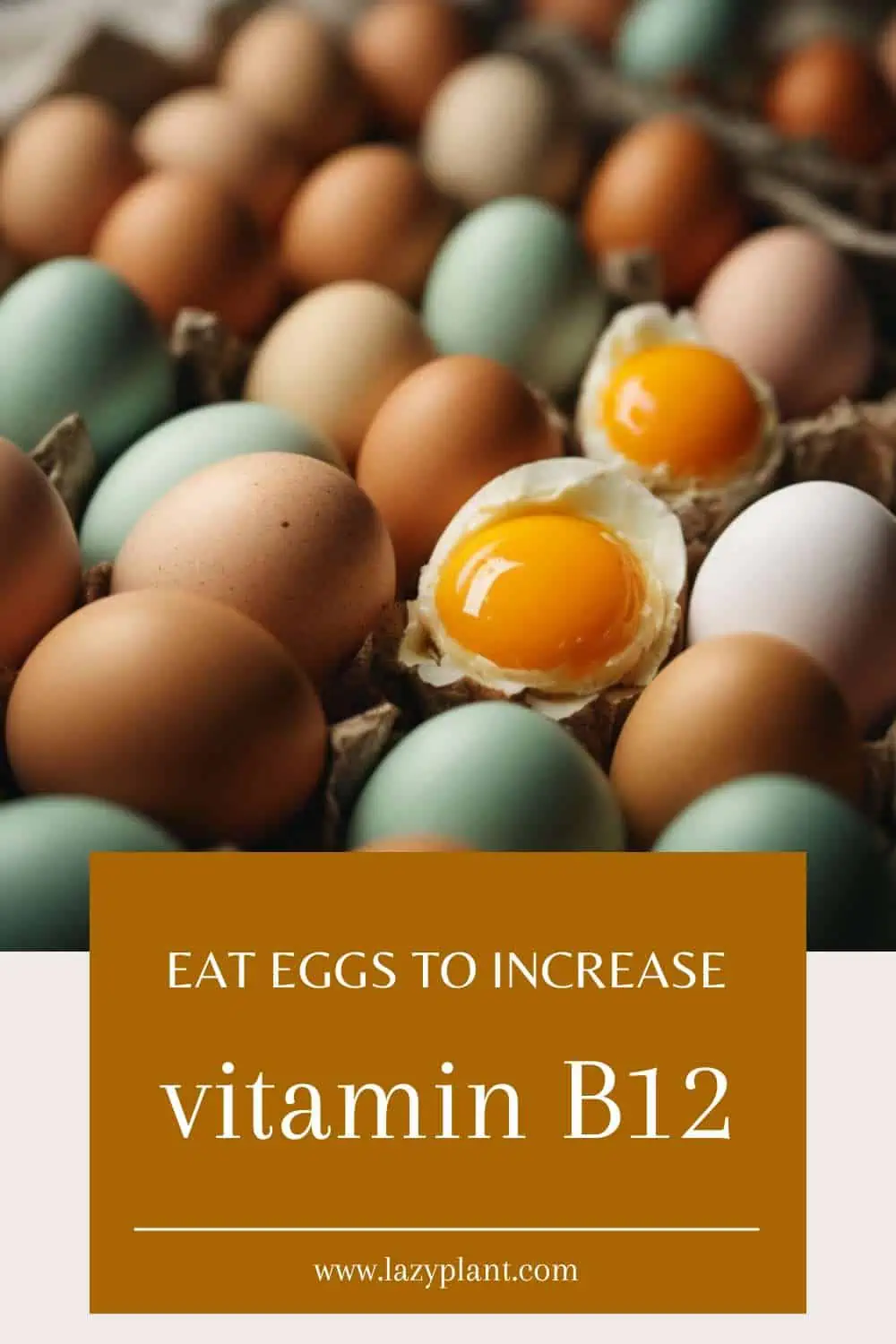
After all, eggs are among the most nutrient-dense foods both adults and children can consume daily. They’re great dietary sources of high-quality protein, choline, vitamin D, vitamin A, iron, calcium, and lecithin. Also, certain eggs are great dietary sources of omega-3 fatty acids.
As an egg has only 75 calories, it supports weight loss!
Do I need Vitamin B12 supplements?
Whether you need vitamin B12 supplements depends on several factors, including your diet, age, health conditions, and individual needs.
- Vegetarians and vegans: As these individuals exclude animal products, which are typically the richest sources of vitamin B12, they are at a higher risk of deficiency. Supplementation can be crucial to ensure adequate intake.
- Older adults: Stomach acid production naturally decreases with age, potentially hindering vitamin B12 absorption from food. Supplementation might be recommended for some older adults, especially those with limited dietary sources.
- Individuals with certain medical conditions: Conditions like Crohn’s disease, celiac disease, and previous surgeries affecting the digestive tract can impair vitamin B12 absorption. Supplementation might be necessary in such cases.
- People with a personal history of B12 deficiency: Individuals who have been diagnosed with vitamin B12 deficiency in the past are likely to require ongoing supplementation to maintain healthy levels.
Signs and symptoms of vitamin B12 deficiency are fatigue and weakness, tingling or numbness in hands and feet, difficulty maintaining balance, anemia, memory problems, and mood changes.
Self-diagnosis and self-treatment with vitamin B12 supplements can be risky and potentially lead to adverse effects. Consulting a healthcare professional is crucial for safe and effective management of your vitamin B12 needs.
You can find a wide variety of vitamin B12 supplements at unbeatable prices on iHerb.
Other common foods high in vitamin B12
Beef liver is the richest food in vitamin B12. Just a serving contains more than 70 mcg of vitamin B12. This dose is 2,940% of the recommended daily intake! But, you should avoid regular consumption of beef liver. It’s particularly high in vitamin A as well. It may cause adverse effects, due to vitamin A overdose!
Fish, cow’s milk, and dairy, as well as meat, such as chicken and turkey, are other good dietary sources of vitamin B12.
There aren’t common plant-based foods high in vitamin B12. Tempeh, chlorella, some other types of algae and seaweed, as well as fortified foods are the only good vegan dietary sources of vitamin B12.
Certainly, taking a vitamin B12 supplement is the best way to boost vitamin B12 intake. Vitamin B12 supplements are considered pretty safe. In fact, vitamin B12 toxicity is rather uncommon. Even extremely high dosages of 1,000 mcg are considered safe.
Recipe Ideas to boost your Vitamin B12 intake
Breakfast (25% DV per serving):
- Scrambled Eggs with Spinach and Feta: Saute spinach with chopped onion and garlic. Scramble eggs with crumbled feta cheese and top with the spinach mixture.
- Breakfast Burrito: Scrambled eggs with salsa, black beans, and cheese. Wrap in a whole-wheat tortilla.
- Egg Muffins: Whisk eggs with chopped vegetables (like peppers, onions, and mushrooms) and cheese. Bake in muffin tins for a convenient grab-and-go option.
- Eggs Benedict: Poach eggs and place them on toasted English muffins topped with Canadian bacon and hollandaise sauce.
Lunch (25% DV per serving):
- Egg Salad Sandwich: Mash hard-boiled eggs with mayonnaise, mustard, and chopped celery. Spread on whole-wheat bread and add lettuce and tomato.
- Cobb Salad: Combine chopped romaine lettuce, grilled chicken breast, avocado, crumbled blue cheese, and a hard-boiled egg.
- Tuna Salad with Eggs: Mix canned tuna with mayonnaise, chopped celery, onion, and a chopped hard-boiled egg. Serve on whole-wheat bread or crackers.
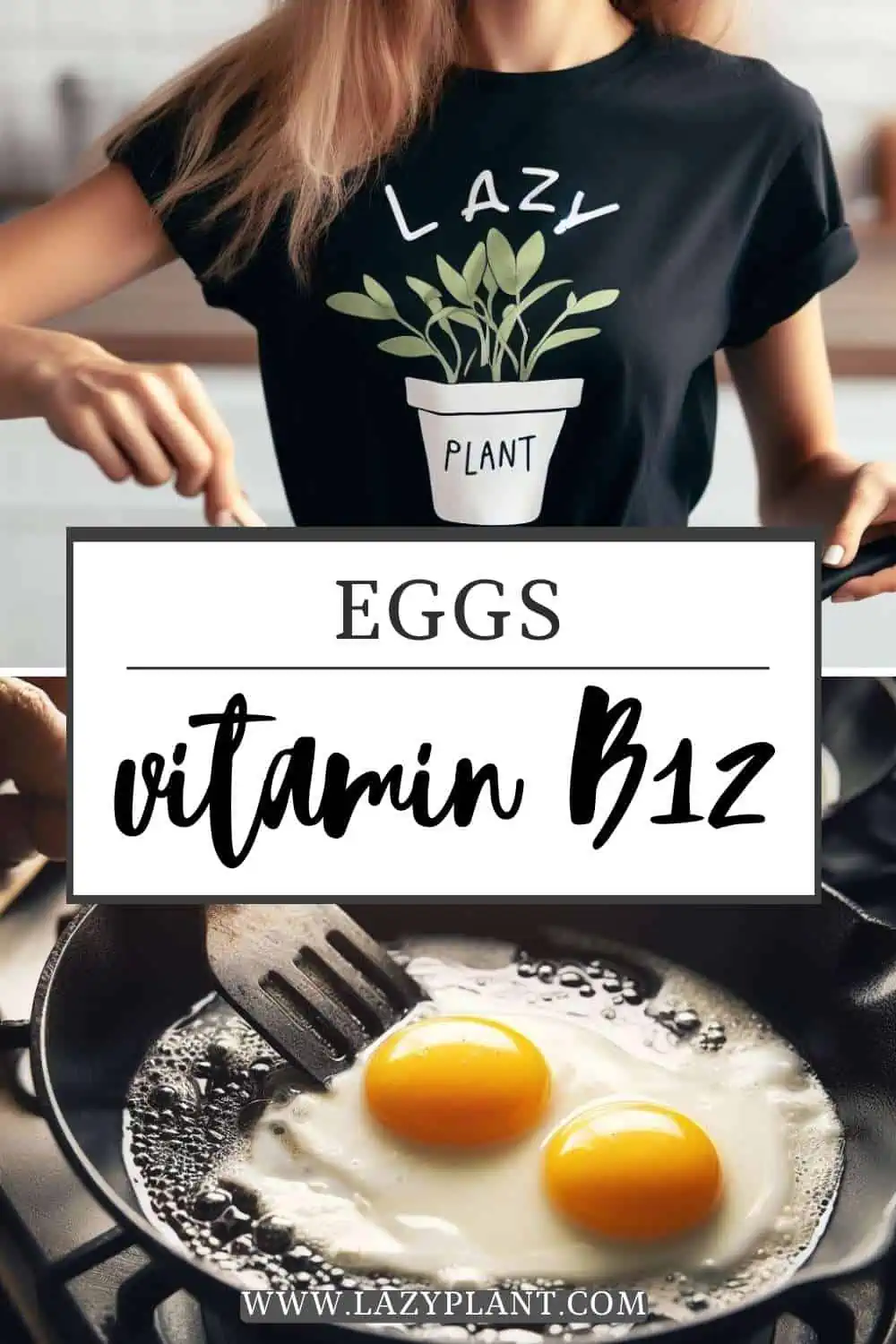
Dinner (25% DV per serving):
- Frittata: Combine whisked eggs with various ingredients like chopped vegetables, cheese, cooked meat, or seafood. Bake in a skillet until set.
- Eggs Florentine: Poach eggs and place them on spinach wilted with garlic and butter. Top with hollandaise sauce.
Snacks (12% DV per serving):
- Egg and Avocado Toast: Mash avocado on whole-wheat toast and top with a fried or poached egg.
- Hard-boiled Eggs: A simple and portable snack rich in protein and vitamin B12.
- Egg Salad Lettuce Wraps: Spoon egg salad onto romaine lettuce leaves for a low-carb option.
- French Toast: Dip bread slices in a mixture of eggs, milk, and spices. Fry until golden brown and top with syrup or fruit.
- Food Cake: A light and fluffy cake made with egg whites, sugar, and flour. Can be enjoyed plain or topped with fruit and whipped cream.
These are just estimates, and the actual vitamin B12 content of each dish can vary depending on the specific ingredients and portion sizes used. Aim for a balanced diet that includes other vitamin B12-rich foods like meat, poultry, fish, dairy products, and fortified options.
14+1 Myths for eating Eggs for boosting Vitamin B12 levels
- Myth 1: Eggs are the best source of vitamin B12 for everyone. Fact: While eggs contain some vitamin B12, they are not the richest source. Meat, poultry, fish, and fortified foods generally provide significantly higher amounts.
- Myth 2: Eating multiple eggs daily is necessary to meet your vitamin B12 needs. Fact: The recommended daily intake of vitamin B12 can be achieved through a balanced diet that includes various sources, not just relying solely on eggs.
- Myth 3: All cooking methods destroy vitamin B12 in eggs. Fact: Common cooking methods like boiling, frying, or baking have minimal impact on the vitamin B12 content of eggs.
- Myth 4: The color of the eggshell (brown vs. white) affects the vitamin B12 content. Fact: The eggshell color is primarily determined by the breed of the hen and has no bearing on the vitamin B12 content of the yolk.
- Myth 5: Organic eggs inherently contain more vitamin B12 than conventional eggs. Fact: The vitamin B12 content in eggs is primarily influenced by the hen’s diet and not necessarily the production method (organic vs. conventional).
- Myth 6: Eggs are a complete source of vitamin B12 and can fully address deficiencies. Fact: Eggs alone are not sufficient to treat vitamin B12 deficiency. Consulting a healthcare professional and potentially using supplements might be necessary in such cases.
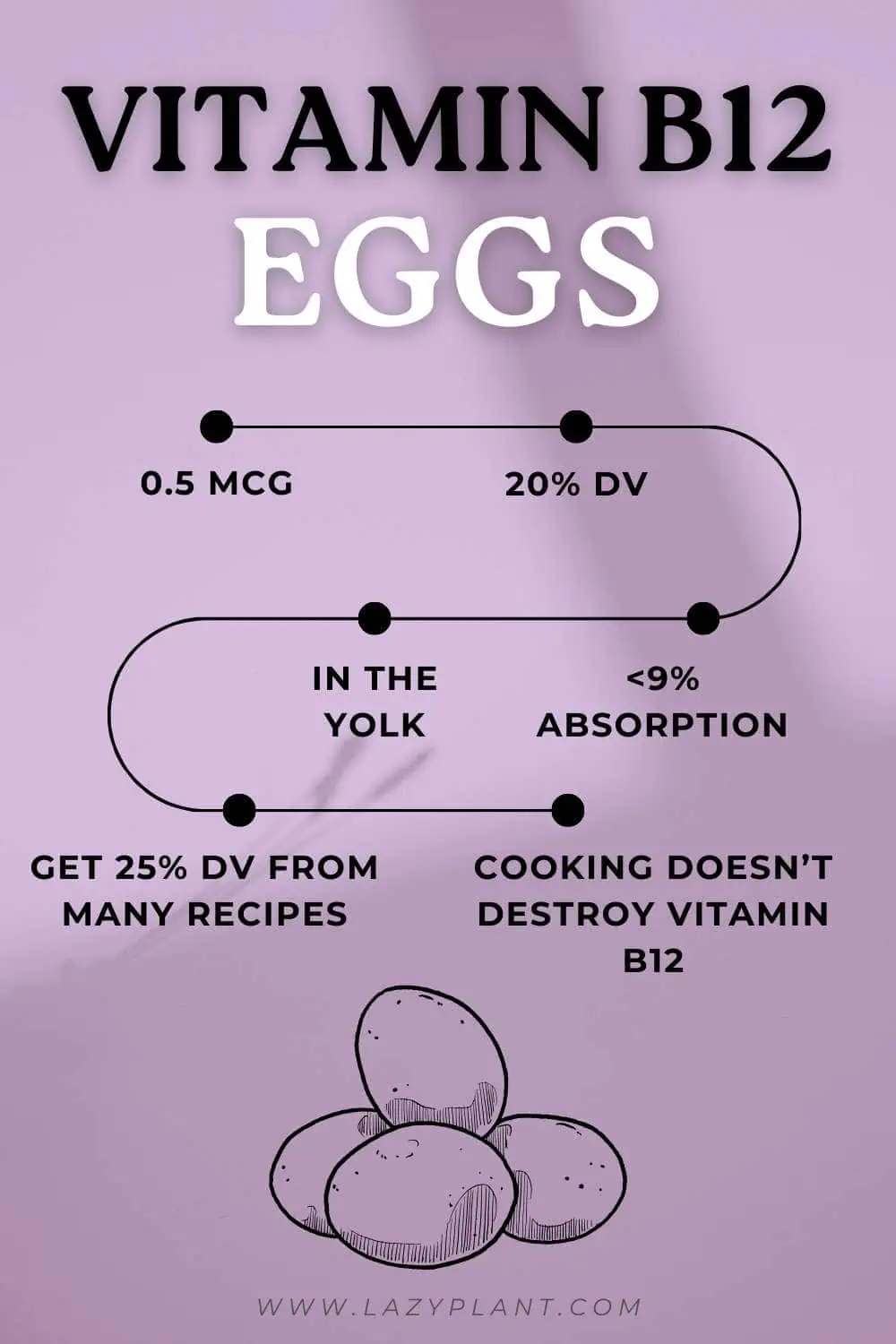
- Myth 7: Consuming excessive amounts of eggs can lead to vitamin B12 toxicity. Fact: Vitamin B12 toxicity is extremely rare and typically occurs through megadoses from supplements, not from dietary sources like eggs.
- Myth 8: Eggs are the only vegetarian source of vitamin B12. Fact: Vegetarians can obtain vitamin B12 from various sources like dairy products, fortified foods, and certain mushrooms and seaweed varieties.
- Myth 9: The fresher the egg, the higher its vitamin B12 content. Fact: The vitamin B12 content in eggs remains relatively stable over storage time and is not significantly affected by freshness.
- Myth 10: Combining eggs with certain foods like coffee or high-fiber vegetables hinders vitamin B12 absorption. Fact: While some factors can slightly impact vitamin B12 absorption, they typically have a minor effect, and a balanced diet can overcome these potential limitations.
- Myth 11: The size of the egg determines its vitamin B12 content. Fact: Larger eggs generally contain more overall nutrients, but the concentration of vitamin B12 per gram of yolk remains relatively similar across different egg sizes.
- Myth 12: Consuming raw eggs increases vitamin B12 absorption. Fact: Raw eggs are not recommended due to the risk of salmonella poisoning. Cooking does not significantly destroy vitamin B12 in eggs.
- Myth 13: Consuming eggs can help you lose weight due to their vitamin B12 content. Fact: While vitamin B12 plays a role in metabolism, it is not a sole factor for weight loss. A balanced diet and regular physical activity are crucial for weight management.
- Myth 14: Eating eggs during pregnancy automatically ensures adequate vitamin B12 intake for both mother and baby. Fact: Pregnant women have increased vitamin B12 needs, and relying solely on eggs might not be sufficient. Prenatal vitamins or additional dietary sources might be recommended by healthcare professionals.
- Myth 15: The taste or texture of eggs affects their vitamin B12 content. Fact: Regardless of how you prepare or enjoy your eggs (boiled, fried, scrambled, etc.), their vitamin B12 content remains relatively unchanged.